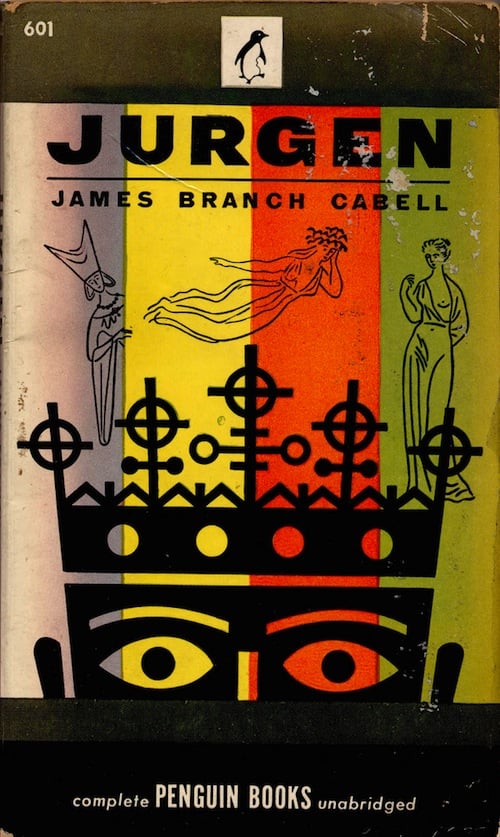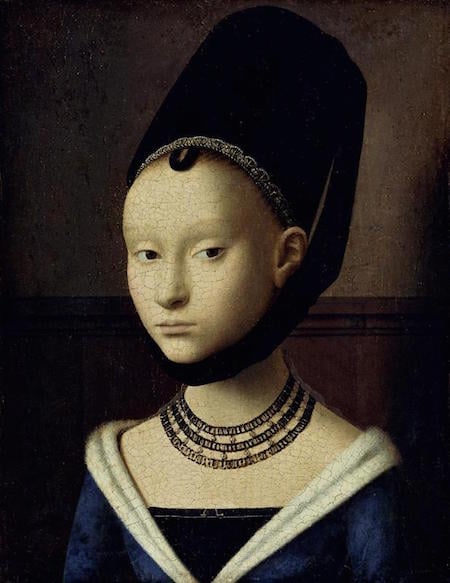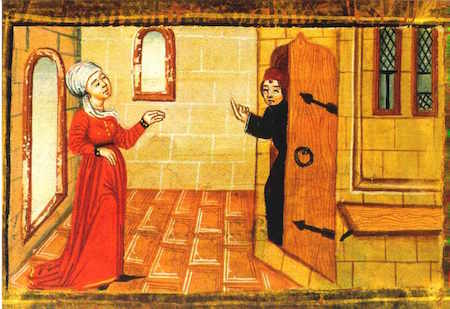Jurgen (51)
By:
March 4, 2016

James Branch Cabell’s 1919 ironic fantasy novel Jurgen, A Comedy of Justice, the protagonist of which seduces women everywhere he travels — including into Arthurian legend and Hell itself — is (according to Aleister Crowley) one of the “epoch-making masterpieces of philosophy.” Cabell’s sardonic inversion of romantic fantasy was postmodernist avant la lettre. HiLoBooks is pleased to serialize Jurgen here at HILOBROW. Enjoy!
And that is really all the story save for the moment Jurgen paused on his way home. For Koshchei (if it, indeed, was Koshchei) had quitted Jurgen just as they approached Bellegarde: and as the pawnbroker walked on alone in the pleasant April evening one called to him from the terrace. Even in the dusk he knew this was the Countess Dorothy.
“May I speak with you a moment?” says she.
“Very willingly, madame.” And Jurgen ascended from the highway to the terrace.
“I thought it would be near your supper hour. So I was waiting here until you passed. You conceive, it is not quite convenient for me to seek you out at the shop.”
“Why, no, madame. There is a prejudice,” said Jurgen, soberly. And he waited.
He saw that Madame Dorothy was perfectly composed, yet anxious to speed the affair. “You must know,” said she, “that my husband’s birthday approaches, and I wish to surprise him with a gift. It is therefore necessary that I raise some money without troubling him. How much — abominable usurer! — could you advance me upon this necklace?”
Jurgen turned it in his hand. It was a handsome piece of jewelry, familiar to him as formerly the property of Heitman Michael’s mother. Jurgen named a sum.
“But that,” the Countess says, “is not a fraction of its worth!”

“Times are very hard, madame. Of course, if you cared to sell outright I could deal more generously.”
“Old monster, I could not do that. It would not be convenient.” She hesitated here. “It would not be explicable.”
“As to that, madame, I could make you an imitation in paste which nobody could distinguish from the original, I can amply understand that you desire to veil from your husband any sacrifices that are entailed by your affection.”
“It is my affection for him,” said the Countess quickly.
“I alluded to your affection for him,” said Jurgen — “naturally.”
Then Countess Dorothy named a price for the necklace. “For it is necessary I have that much, and not a penny less.” And Jurgen shook his head dubiously, and vowed that ladies were unconscionable bargainers: but Jurgen agreed to what she asked, because the necklace was worth almost as much again. Then Jurgen suggested that the business could be most conveniently concluded through an emissary.
“If Messire de Nérac, for example, could have matters explained to him, and could manage to visit me tomorrow, I am sure we could carry through this amiable imposture without any annoyance whatever to Heitman Michael,” says Jurgen, smoothly.
“Nérac will come then,” says the Countess. “And you may give him the money, precisely as though it were for him.”
“But certainly, madame. A very estimable young nobleman, that! and it is a pity his debts are so large. I heard that he had lost heavily at dice within the last month; and I grieved, madame.”
“He has promised me when these debts are settled to play no more — But again what am I saying! I mean, Master Inquisitive, that I take considerable interest in the welfare of Messire de Nérac: and so I have sometimes chided him on his wild courses. And that is all I mean.”
“Precisely, madame. And so Messire de Nérac will come to me to-morrow for the money: and there is no more to say.”
Jurgen paused. The moon was risen now. These two sat together upon a bench of carved stone near the balustrade: and before them, upon the other side of the highway, were luminous valleys and tree-tops. Fleetingly Jurgen recollected the boy and girl who had once sat in this place, and had talked of all the splendid things which Jurgen was to do, and of the happy life that was to be theirs together. Then he regarded the composed and handsome woman beside him, and he considered that the money to pay her latest lover’s debts had been assured with a suitable respect for appearances.
“Come, but this is a gallant lady, who would defy the almanac,” reflected Jurgen. “Even so, thirty-eight is an undeniable and somewhat autumnal figure, and I suspect young Nérac is bleeding his elderly mistress. Well, but at his age nobody has a conscience. Yes, and Madame Dorothy is handsome still; and still my pulse is playing me queer tricks, because she is near me, and my voice has not the intonation I intend, because she is near me; and still I am three-quarters in love with her. Yes, in the light of such cursed folly as even now possesses me, I have good reason to give thanks for the regained infirmities of age. Yet living seems to me a wasteful and inequitable process, for this is a poor outcome for the boy and girl that I remember. And weighing this outcome, I am tempted to weep and to talk romantically, even now.”
But he did not. For really, weeping was not requisite. Jurgen was making his fair profit out of the Countess’s folly, and it was merely his duty to see that this little business transaction was managed without any scandal.
“So there is nothing more to say,” observed Jurgen, as he rose in the moonlight, “save that I shall always be delighted to serve you, madame, and I may reasonably boast that I have earned a reputation for fair dealing.”
And he thought: “In effect, since certainly as she grows older she will need yet more money for her lovers, I am offering to pimp for her.” Then Jurgen shrugged. “That is one side of the affair. The other is that I transact my legitimate business, — I, who am that which the years have made of me.”
Thus it was that Jurgen quitted the Countess Dorothy, whom, as you have heard, this pawnbroker had loved in his first youth under the name of Heart’s Desire; and whom in the youth that was loaned him by Mother Sereda he had loved as Queen Helen, the delight of gods and men. For Jurgen was quitting Madame Dorothy after the simplest of business transactions, which consumed only a moment, and did not actually count one way or the other.

And after this moment which did not count, the pawnbroker resumed his journey, and so came presently to his home. He peeped through the window. And there in a snug room, with supper laid, sat Dame Lisa about some sewing, and evidently in a quite amiable frame of mind.
Then terror smote the Jurgen who had faced sorcerers and gods and devils intrepidly. “For I forgot about the butter!”
But immediately afterward he recollected that, now, not even what Lisa had said to him in the cave was real. Neither he nor Lisa, now, had ever been in the cave, and probably there was no longer any such place, and now there never had been any such place. It was rather confusing.
“Ah, but I must remember carefully,” said Jurgen, “that I have not seen Lisa since breakfast, this morning. Nothing whatever has happened. There has been no requirement laid upon me, after all, to do the manly thing. So I retain my wife, such as she is, poor dear! I retain my home. I retain my shop and a fair line of business. Yes, Koshchei — if it was really Koshchei — has dealt with me very justly. And probably his methods are everything they should be; certainly I cannot go so far as to say that they are wrong: but still, at the same time —!”
Then Jurgen sighed, and entered his snug home. Thus it was in the old days.
RADIUM AGE SCIENCE FICTION: “Radium Age” is HILOBROW’s name for the 1904–33 era, which saw the discovery of radioactivity, the revelation that matter itself is constantly in movement — a fitting metaphor for the first decades of the 20th century, during which old scientific, religious, political, and social certainties were shattered. This era also saw the publication of genre-shattering writing by Edgar Rice Burroughs, Sax Rohmer, E.E. “Doc” Smith, Jack London, Arthur Conan Doyle, Aldous Huxley, Olaf Stapledon, Karel Čapek, H.P. Lovecraft, Charlotte Perkins Gilman, Yevgeny Zamyatin, Philip Gordon Wylie, and other pioneers of post-Verne/Wells, pre-Golden Age “science fiction.” More info here.
READ GORGEOUS PAPERBACKS: HiLoBooks has reissued the following 10 obscure but amazing Radium Age science fiction novels in beautiful print editions: Jack London’s The Scarlet Plague, Rudyard Kipling’s With the Night Mail (and “As Easy as A.B.C.”), Arthur Conan Doyle’s The Poison Belt, H. Rider Haggard’s When the World Shook, Edward Shanks’ The People of the Ruins, William Hope Hodgson’s The Night Land, J.D. Beresford’s Goslings, E.V. Odle’s The Clockwork Man, Cicely Hamilton’s Theodore Savage, and Muriel Jaeger’s The Man with Six Senses. For more information, visit the HiLoBooks homepage.
SERIALIZED BY HILOBOOKS: Jack London’s The Scarlet Plague | Rudyard Kipling’s With the Night Mail (and “As Easy as A.B.C.”) | Arthur Conan Doyle’s The Poison Belt | H. Rider Haggard’s When the World Shook | Edward Shanks’ The People of the Ruins | William Hope Hodgson’s The Night Land | J.D. Beresford’s Goslings | E.V. Odle’s The Clockwork Man | Cicely Hamilton’s Theodore Savage | Muriel Jaeger’s The Man With Six Senses | Jack London’s “The Red One” | Philip Francis Nowlan’s Armageddon 2419 A.D. | Homer Eon Flint’s The Devolutionist | W.E.B. DuBois’s “The Comet” | Edgar Rice Burroughs’s The Moon Men | Charlotte Perkins Gilman’s Herland | Sax Rohmer’s “The Zayat Kiss” | Eimar O’Duffy’s King Goshawk and the Birds | Frances Hodgson Burnett’s The Lost Prince | Morley Roberts’s The Fugitives | Helen MacInnes’s The Unconquerable | Geoffrey Household’s Watcher in the Shadows | William Haggard’s The High Wire | Hammond Innes’s Air Bridge | James Branch Cabell’s Jurgen | John Buchan’s “No Man’s Land” | John Russell’s “The Fourth Man” | E.M. Forster’s “The Machine Stops” | John Buchan’s Huntingtower | Arthur Conan Doyle’s When the World Screamed | Victor Bridges’ A Rogue By Compulsion | Jack London’s The Iron Heel | H. De Vere Stacpoole’s The Man Who Lost Himself | P.G. Wodehouse’s Leave It to Psmith | Richard Connell’s “The Most Dangerous Game” | Houdini and Lovecraft’s “Imprisoned with the Pharaohs” | Arthur Conan Doyle’s “The Sussex Vampire”.
ORIGINAL FICTION: HILOBROW has serialized three novels: James Parker’s The Ballad of Cocky The Fox (“a proof-of-concept that serialization can work on the Internet” — The Atlantic); Karinne Keithley Syers’s Linda Linda Linda (which includes original music); and Robert Waldron’s roman à clef The School on the Fens. We also publish original stories and comics. These include: Matthew Battles’s stories “Gita Nova“, “Makes the Man,” “Imago,” “Camera Lucida,” “A Simple Message”, “Children of the Volcano”, “The Gnomon”, “Billable Memories”, “For Provisional Description of Superficial Features”, “The Dogs in the Trees”, “The Sovereignties of Invention”, and “Survivor: The Island of Dr. Moreau”; several of these later appeared in the collection The Sovereignties of Invention | Peggy Nelson’s “Mood Indigo“, “Top Kill Fail“, and “Mercerism” | Annalee Newitz’s “The Great Oxygen Race” | Flourish Klink’s Star Trek fanfic “Conference Comms” | Charlie Mitchell’s “A Fantasy Land” | Charlie Mitchell’s “Sentinels” | Joshua Glenn’s “The Lawless One”, and the mashup story “Zarathustra vs. Swamp Thing” | Adam McGovern and Paolo Leandri’s Idoru Jones comics | John Holbo’s “Sugarplum Squeampunk” | “Another Corporate Death” (1) and “Another Corporate Death” (2) by Mike Fleisch | Kathryn Kuitenbrouwer and Frank Fiorentino’s graphic novel “The Song of Otto” (excerpt) | John Holbo’s graphic novel On Beyond Zarathustra (excerpt) | “Manoj” and “Josh” by Vijay Balakrishnan | “Verge” by Chris Rossi, and his audio novel Low Priority Hero | EPIC WINS: THE ILIAD (1.408-415) by Flourish Klink | EPIC WINS: THE KALEVALA (3.1-278) by James Parker | EPIC WINS: THE ARGONAUTICA (2.815-834) by Joshua Glenn | EPIC WINS: THE MYTH OF THE ELK by Matthew Battles | TROUBLED SUPERHUMAN CONTEST: Charles Pappas, “The Law” | CATASTROPHE CONTEST: Timothy Raymond, “Hem and the Flood” | TELEPATHY CONTEST: Rachel Ellis Adams, “Fatima, Can You Hear Me?” | OIL SPILL CONTEST: A.E. Smith, “Sound Thinking | LITTLE NEMO CAPTION CONTEST: Joe Lyons, “Necronomicon” | SPOOKY-KOOKY CONTEST: Tucker Cummings, “Well Marbled” | INVENT-A-HERO CONTEST: TG Gibbon, “The Firefly” | FANFICTION CONTEST: Lyette Mercier’s “Sex and the Single Superhero”
